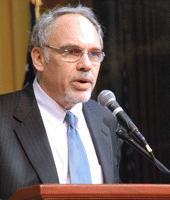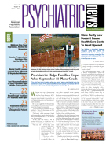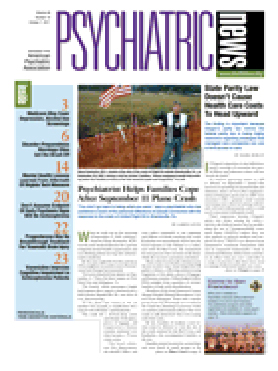Maybe it's just coincidence, but the last decade has seen an extraordinary number of intense disasters, said Irwin Redlener, M.D., co-organizer with Sandro Galea, M.D., Dr.P.H., of a conference on science, policy, and public health at Columbia University in September.
Redlener ran down a list: September 11; anthrax mailings; crash of a plane headed to the Dominican Republic near JFK Airport; the D.C. snipers; SARS; terror attacks in London, Madrid, and Beslan, Russia; hurricanes Katrina, Rita, and Ike; earthquakes in Haiti and Japan; two major tsunamis; nuclear-plant radiation leaks; floods; tornadoes; crippling blizzards; and several varieties of influenza.
"Were these events and our experience with them true wake-up calls that prompted us to institute changes to prevent or mitigate damage?" asked Redlener. "Or were they just snooze alarms, where we hit the button and went back to sleep?"
Redlener is a clinical professor of pediatrics in the College of Physicians and Surgeons, a clinical professor of population and family health in the Mailman School of Public Health, and the director of the National Center for Disaster Preparedness (NCDP), all at Columbia.
A recent national survey by Marist College and the NCDP found that while 72 percent of the American public believed that more terrorist attacks were likely, 65 percent were personally unprepared for a disaster.
"Large numbers of Americans are not getting the message or not acting on it," he said.
Expectations may exceed capacity, Response systems (like 911 phone lines) that function fairly well in ordinary circumstances get overwhelmed quickly in emergencies.
"The belief that help is on the way no matter what happens is demotivating," said Redlener. "People think: Why prepare?"
Perhaps Redlener is a pessimist, but he sees way too many gaps in preparedness. Hospital surge capacity is less than what one would have expected 10 years after September 11, he believes. There are still gaps in medical countermeasures needed to respond to outbreaks of disease.
At-risk populations remain vulnerable to the hardships caused by disasters. Close to half the U.S. population can be placed in that category: children, the elderly, the chronically ill, the homebound, and the institutionalized. They are usually seen as afterthoughts to disaster plans, but, in aggregate, "they are not outliers; they are us," he said.
There are also major gaps in the unity of command and effort between federal, state, and local authorities in response to disaster, said Redlener, citing his experience observing a training exercise for a mock earthquake along the New Madrid Fault in Missouri.
In that event, after local medical personnel triaged "injured" children, a National Guard helicopter arrived to take them to the hospital. Rather than loading the children into the copter and taking off, the pilot told Redlener that a Guard team would have to triage the children all over again. In a real emergency, the delay might have cost several children their lives.
"It's my chopper," said the pilot, and only his commanding officer, who was not on the scene, could overrule the standard procedure.
The prospects for making progress in preparing for disasters have been pummeled by the recession and partisan budget conflicts in Washington, D.C., he said.
"Those factors have taken off the table any possible deliberations to help plan for and respond to disasters," he said.
Redlener wants citizens and legislators to consider the policy choices.
"Where is the public discourse?" he asked. "Where are the informed intellectual, social, ethical, and moral discussions of priorities in America?"
How, for instance, might the nation allocate a hypothetical $1 billion if it were available, he asked. "For children's health care, better disaster preparation, or an improved social safety net?"
In any case, Fiscal 2011 preparedness budgets were insufficient and now are being degraded further, he said. Programs for medical countermeasures, disaster training in academic medical centers, or preparing schools to face disasters have been reduced or slated for elimination in future budget cycles, he said.
Even Department of Homeland Security programs for preparedness and response are being cut.
"All that represents a profound barrier to building capacity," he said. "Are we prepared? Not yet, and it doesn't look good, sorry to say."


